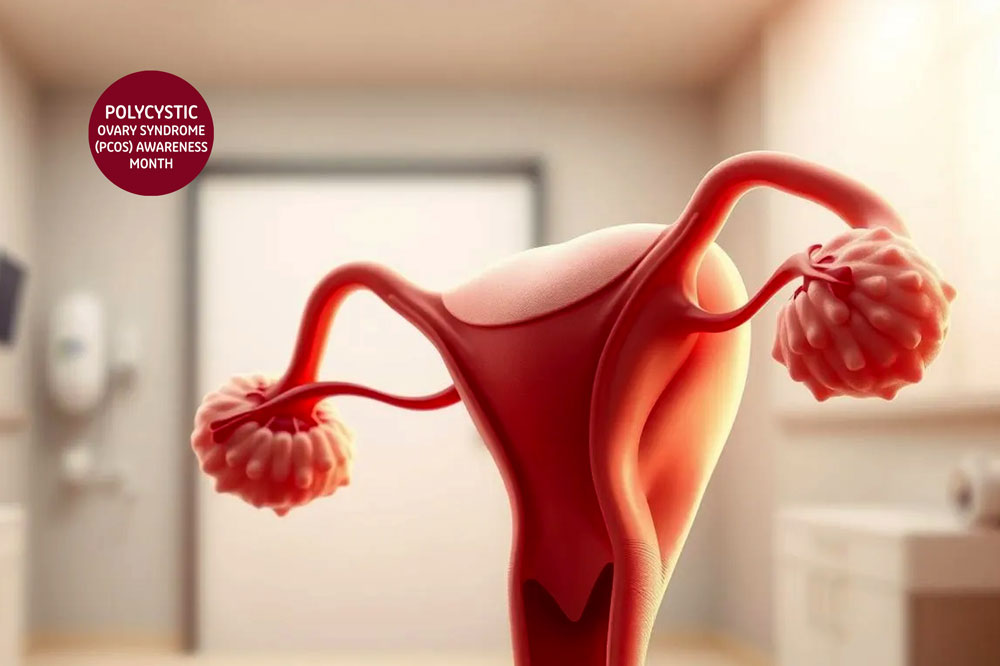PCOS Awareness Month in India
Prioritising women’s health
In India and globally, the month of September holds special significance as it is observed globally as PCOS (Polycystic Ovary Syndrome) Awareness Month. This observance is even more relevant in the Indian context as PCOS has become one of the most common hormonal disorders among women of reproductive age. In fact, it affects nearly 1 in 5 Indian women. Even so the condition often goes undiagnosed, under-discussed and misunderstood. PCOS Awareness Month aims to shine the spotlight on this disease, spread accurate information and encourage timely care.

Casting a light on PCOS
To combat this affliction, we first need to know everything about it and what it is. Simply put, PCOS is a hormonal imbalance that affects the ovaries, leading to irregular or absent periods, difficulty in ovulation and multiple small cysts in the ovaries. It is also linked to excess levels of androgens (male hormones), which can cause acne, excessive hair growth and scalp hair thinning. Apart from affection reproductive health, PCOS also increases the risk of obesity, insulin resistance, type 2 diabetes, cardiovascular disease and infertility.
Awareness levels in the subcontinent
In India, PCOS is rampant with lifestyle changes, rising stress levels and sedentary habits being the primary reasons for its occurrence. Yet surprisingly awareness about the disorder remains low. Many young women dismiss irregular periods or weight gain as minor concerns, not realising these could be early signs of PCOS. There is also no dearth of misconceptions with many believing that PCOS only affects fertility or that it cannot be managed without lifelong medication.
In this context, the Awareness Month assumes greater significance as it provides an opportunity to correct these myths. It highlights the importance of early diagnosis, regular health check-ups and holistic management, which includes medical guidance, lifestyle modifications and mental health support.
Acknowledging and alleviating the stigma
Like it or not, in India, there is still a lot of stigma associated with PCOS. Breaking this stigma is another crucial goal of PCOS Awareness Month. In many parts of India, menstruation and fertility struggles remain taboo topics. Women often hesitate to speak openly about their symptoms, which delays treatment. Awareness campaigns encourage open conversations, making it easier for women to seek help without fear or shame.
Making education the differentiator
Spreading education and awareness is the best way to combat PCOS. This is given greater emphasis during PCOS Awareness Month when healthcare professionals, NGOs and wellness organisations across India conduct workshops, social media drives, health camps and panel discussions.
These initiatives educate women about the importance of a balanced diet, regular exercise, stress management and timely medical intervention. Schools and colleges also play a key role in sensitising young women, helping them recognise symptoms early.
Life with PCOS
Unfortunately, PCOS is not curable. But the good news is that it is very manageable. Doctors often recommend lifestyle modification such as eating a nutrient-rich diet, maintaining a healthy weight and engaging in regular physical activity to reduce symptoms and prevent complications.
Medications may also be prescribed to regulate menstrual cycles, improve fertility and manage hormonal imbalances.
However, what is crucial is to recognise that PCOS management is not just about physical health. Women affected by PCOS may experience anxiety, depression and body-image concerns. Awareness Month focuses on this overlooked aspect and emphasises the need for emotional support, counselling and community networks to assist afflicted women.
A movement with purpose
PCOS Awareness Month in India carries great weight as it is primarily a movement aimed at prioritising women’s health. This it seeks to do by breaking myths, encouraging dialogue and fostering support. One of the purposes of the month is to ensure that women do not have to suffer in silence. With awareness, early detection and proper management, women with PCOS can lead healthy, fulfilling lives.